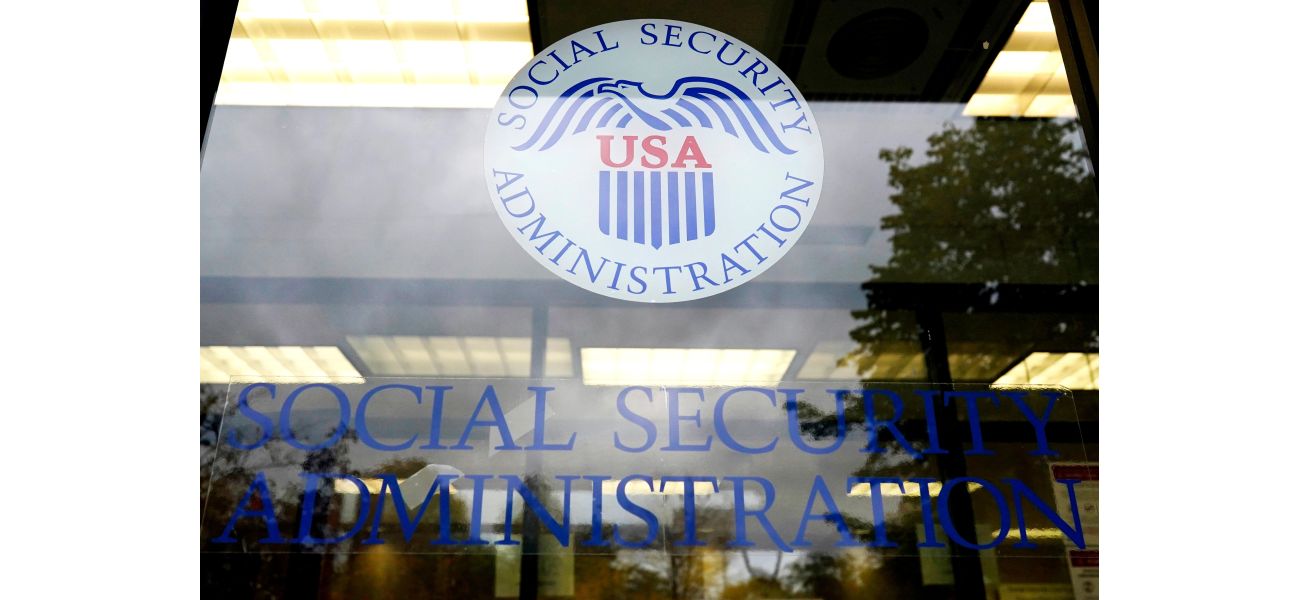Biden is signing a bill that will provide increased Social Security payments for millions of public service workers.
"Biden to sign law that increases Social Security payments for 3 million public employees with pensions from teaching, firefighting, policing, and other public service jobs."
January 5th 2025.

On Sunday, President Joe Biden is set to sign a new law that will have a significant impact on nearly 3 million Americans. This measure will provide a much-needed boost in Social Security payments for current and former public employees, such as teachers, firefighters, and police officers. For years, advocates have fought for this change, arguing that it corrects a long-standing disparity and brings justice to those who have dedicated their lives to public service. However, this change also comes with its own set of challenges, as it puts a strain on the Social Security Trust Funds, which are already facing an impending insolvency crisis.
The main provisions of this law are the rescission of two policies known as the Windfall Elimination Provision and the Government Pension Offset. These policies have been limiting the amount of Social Security benefits for recipients who also receive retirement payments from other sources, such as state or local government programs. According to the Congressional Research Service, as of December 2023, about 1% of all Social Security beneficiaries were affected by the Government Pension Offset, while about 3% were impacted by the Windfall Elimination Provision.
The Congressional Budget Office estimates that by December 2025, the elimination of these two policies will result in an average increase of $360 in monthly payments for those affected by the Windfall Elimination Provision and an average increase of $700 for those affected by the Government Pension Offset. These increases will continue to grow over time, as they will be adjusted annually to account for the cost of living.
These changes will go into effect in January 2024, and the Social Security Administration will owe back-dated payments to those affected. The law states that the Social Security commissioner "shall adjust primary insurance amounts to the extent necessary to take into account" the changes. It is yet to be seen how this will be implemented, and whether individuals affected will need to take any additional action.
Edward Kelly, president of the International Association of Fire Fighters, expressed his excitement for this change, calling it a "40-year wrong" that has finally been corrected. He also noted that this policy has been particularly damaging for surviving spouses of firefighters who have paid into Social Security but have been deprived of their rightful benefits due to the government pension system. The IAFF, with over 320,000 members and hundreds of thousands of retirees who will benefit from this change, is thrilled to see this long-overdue reform.
Senator Sherrod Brown, who has been pushing for this change for years, lost his reelection bid in November. However, his efforts did not go unnoticed, as Lee Saunders, president of the American Federation of State, County and Municipal Employees, thanked him for his advocacy. Saunders also emphasized that this new law will finally allow over 2 million public service workers to access the Social Security benefits they have been paying into throughout their careers. This sentiment was echoed by National Education Association President Becky Pringle, who called this a "historic victory" for educators, first responders, and other public servants.
While there were some Republican supporters of this bill, such as Senator Susan Collins from Maine, others, including Senators John Thune of South Dakota, Rand Paul of Kentucky, and Thom Tillis of North Carolina, voted against it. Senator Tillis explained his opposition, stating that the decision to pass this law was based on "the pressure of the moment" rather than a sustainable solution. However, Republican supporters of the bill argued that this was a rare opportunity to address an unfair section of federal law that has been hurting public service retirees for far too long.
The future of Social Security has been a hot topic in recent years and was a major point of contention in the 2024 election. With over 72.5 million people, including retirees, disabled individuals, and children, relying on Social Security benefits, it is a crucial program that needs to be properly managed. However, the implementation of this new law will add a significant administrative burden on the Social Security Administration, which is already facing staffing shortages. With a current hiring freeze in place, the agency's staff of about 56,645 is at its lowest level in over 50 years, despite serving more people than ever.
The annual report released by the Social Security and Medicare trustees in May 2021 predicted that the program's trust fund would be unable to pay full benefits starting in 2035. This new law will accelerate the program's insolvency date by approximately six months. While this change may bring much-needed relief to those affected by the Windfall Elimination Provision and the Government Pension Offset, it also highlights the urgency of addressing the overall sustainability of Social Security in the long run.
The main provisions of this law are the rescission of two policies known as the Windfall Elimination Provision and the Government Pension Offset. These policies have been limiting the amount of Social Security benefits for recipients who also receive retirement payments from other sources, such as state or local government programs. According to the Congressional Research Service, as of December 2023, about 1% of all Social Security beneficiaries were affected by the Government Pension Offset, while about 3% were impacted by the Windfall Elimination Provision.
The Congressional Budget Office estimates that by December 2025, the elimination of these two policies will result in an average increase of $360 in monthly payments for those affected by the Windfall Elimination Provision and an average increase of $700 for those affected by the Government Pension Offset. These increases will continue to grow over time, as they will be adjusted annually to account for the cost of living.
These changes will go into effect in January 2024, and the Social Security Administration will owe back-dated payments to those affected. The law states that the Social Security commissioner "shall adjust primary insurance amounts to the extent necessary to take into account" the changes. It is yet to be seen how this will be implemented, and whether individuals affected will need to take any additional action.
Edward Kelly, president of the International Association of Fire Fighters, expressed his excitement for this change, calling it a "40-year wrong" that has finally been corrected. He also noted that this policy has been particularly damaging for surviving spouses of firefighters who have paid into Social Security but have been deprived of their rightful benefits due to the government pension system. The IAFF, with over 320,000 members and hundreds of thousands of retirees who will benefit from this change, is thrilled to see this long-overdue reform.
Senator Sherrod Brown, who has been pushing for this change for years, lost his reelection bid in November. However, his efforts did not go unnoticed, as Lee Saunders, president of the American Federation of State, County and Municipal Employees, thanked him for his advocacy. Saunders also emphasized that this new law will finally allow over 2 million public service workers to access the Social Security benefits they have been paying into throughout their careers. This sentiment was echoed by National Education Association President Becky Pringle, who called this a "historic victory" for educators, first responders, and other public servants.
While there were some Republican supporters of this bill, such as Senator Susan Collins from Maine, others, including Senators John Thune of South Dakota, Rand Paul of Kentucky, and Thom Tillis of North Carolina, voted against it. Senator Tillis explained his opposition, stating that the decision to pass this law was based on "the pressure of the moment" rather than a sustainable solution. However, Republican supporters of the bill argued that this was a rare opportunity to address an unfair section of federal law that has been hurting public service retirees for far too long.
The future of Social Security has been a hot topic in recent years and was a major point of contention in the 2024 election. With over 72.5 million people, including retirees, disabled individuals, and children, relying on Social Security benefits, it is a crucial program that needs to be properly managed. However, the implementation of this new law will add a significant administrative burden on the Social Security Administration, which is already facing staffing shortages. With a current hiring freeze in place, the agency's staff of about 56,645 is at its lowest level in over 50 years, despite serving more people than ever.
The annual report released by the Social Security and Medicare trustees in May 2021 predicted that the program's trust fund would be unable to pay full benefits starting in 2035. This new law will accelerate the program's insolvency date by approximately six months. While this change may bring much-needed relief to those affected by the Windfall Elimination Provision and the Government Pension Offset, it also highlights the urgency of addressing the overall sustainability of Social Security in the long run.
[This article has been trending online recently and has been generated with AI. Your feed is customized.]
[Generative AI is experimental.]
0
0
Submit Comment





